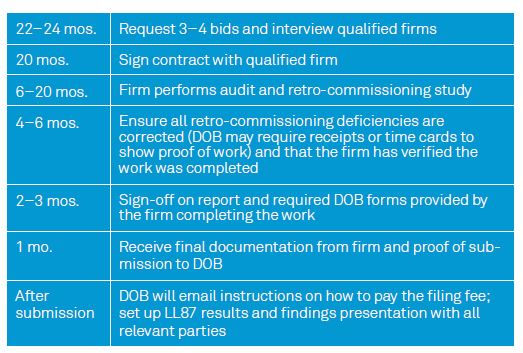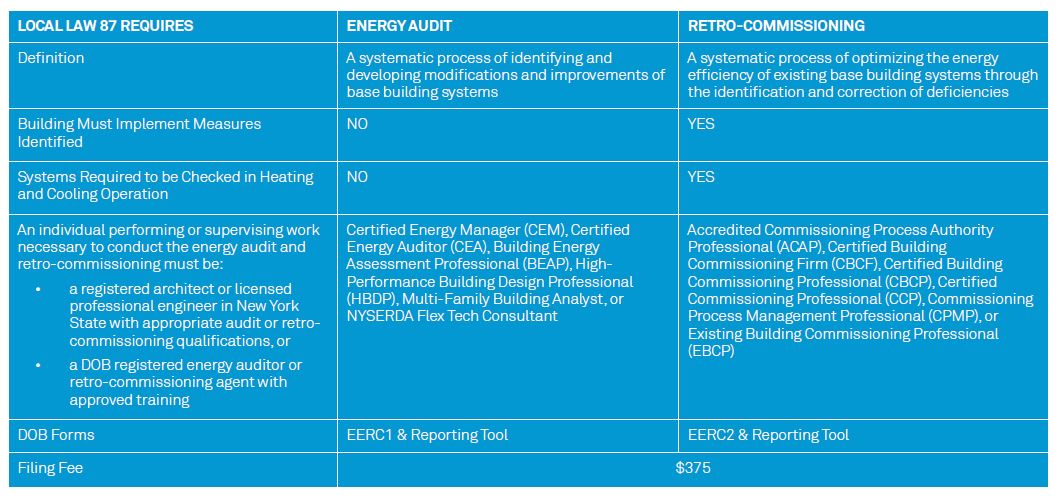Understanding and Utilizing Local Law 87 For Your NYC Property
As part of New York City’s Greener, Greater Buildings Plan, in 2012 the city enacted Local Law 87 (LL87) which mandates all buildings over 50,000 square feet complete an energy audit and retro-commissioning study of base building systems once every 10 years. The law defines base building systems as: the building envelope, HVAC (heating, ventilating and air conditioning) systems, conveying systems, domestic hot water systems, and electrical and lighting systems.
By working directly with auditors and engineers, the purpose of New York city Local Law 87 is to help building owners and operators (1) ensure their building’s mechanical equipment is operating efficiently, and (2) identify project opportunities, known as Energy Conservation Measures (ECMs), to further reduce energy consumption.
Your building’s due date for filing its audit is determined by the last digit of the tax block number as shown below:

Auditors and retro-commissioning agents who perform and signoff on the work are required to have certain certifications and/or professional licenses. (Please refer to the chart below.)
Selecting Your Local Law 87 Firm
Identifying and selecting a qualified and reputable firm to perform your New York City Local Law 87 project can be a daunting process. Many new firms have joined the market since this law was enacted which has created a broad range of services and experiences. That’s why it is important to seek proposals from multiple firms and request:
Planning for Success—Setting a Timeline
Starting the process early will ensure that your building selects the right firm and you get thorough results instead of rushing to make the deadline. The retro-commissioning part of the law requires that buildings with heating and cooling systems be tested in summer and winter operation. Therefore, it is important to allow enough time for your retro-commissioning agents to test the equipment and for the building to correct any deficiencies found.
The Energy Efficiency Report (EER) must be submitted to the DOB by December 31st of the year the building is required to comply. Buildings that do not submit their report will be issued a Major
Class 2 violation and be fined $3,000 the first year and $5,000 each subsequent year until the report is submitted. You will receive the best results when you plan ahead, budget appropriately, and give the selected firm 16–18 months to complete and submit the report.
Here is a timeline to help your building plan accordingly:

Maximizing the Value of Your Building Operators
Local law 87 is as an opportunity to identify where your building is wasting energy and money. Buildings will see the best results when the staff is learning from the engineer performing the work. When the staff is engaged they will be a part of the solution that allows your building to continue to operate efficiently long after the study is complete. Here are some tips to ensure engagement:
After receiving your Local Law 87 report, it is important to be engaged in the results. This is your opportunity to get an overview of how your building operates and what projects can be done to reduce consumption and costs.
Here are some tips to keep the momentum going:-_sm)
FirstService Residential Value Driven Service
In an effort to reduce the complexity and costs incurred by FirstService Residential properties in complying with local law 87, FS Energy has set up a vetting and partnership program with 12 qualified vendors. After analyzing the proposals and filings from among 28 firms that have performed Local law 87 work at over 100 FirstService Residential properties, we believe these select vendors deliver the best services at the most competitive rates.
Well in advance of your building’s compliance deadline, FS Energy will choose a handful of firms to bid based on their expertise and experience with your property’s specific systems. Of course, the board may obtain additional bids from other vendors. FS Energy will then review and present the proposals to your property manager and the board.
As an additional benefit, FirstService Residential clients will pay less for Local law 87 services as a result of lower fees negotiated by FS Energy. This discount is in exchange for work that will be provided by
FS Energy’s Data Team, which includes collecting and submitting historical energy data, utility bill analysis, typology collection, Energy Report Card production, and historical energy assessments.
Our partner firms have agreed that the sum of the services provided by FS Energy is equivalent to 30% of the total project cost. Therefore, FS Energy will retain 10% of the savings for its services and the remaining 20% will be passed on directly to FirstService Residential clients.
FS Energy’s partnerships will:
FS Energy at (212) 634-5500 or [email protected].
Or you can simply contact us today, so we can assist you with all of your property management needs.

By working directly with auditors and engineers, the purpose of New York city Local Law 87 is to help building owners and operators (1) ensure their building’s mechanical equipment is operating efficiently, and (2) identify project opportunities, known as Energy Conservation Measures (ECMs), to further reduce energy consumption.
Your building’s due date for filing its audit is determined by the last digit of the tax block number as shown below:
Auditors and retro-commissioning agents who perform and signoff on the work are required to have certain certifications and/or professional licenses. (Please refer to the chart below.)
Selecting Your Local Law 87 Firm
Identifying and selecting a qualified and reputable firm to perform your New York City Local Law 87 project can be a daunting process. Many new firms have joined the market since this law was enacted which has created a broad range of services and experiences. That’s why it is important to seek proposals from multiple firms and request:
- Staff resumes indicating required certifications
- Two to three previous Local Law 87 clients that can be contacted for recommendations
- Sample Local Law 87 Report and Energy Efficiency Report (EER)
- Project timeline
- That the firm includes, as part of their fee, training of the building staff during and after the retro-commissioning study
- That the firm addresses any questions, interviews, or corrections presented by the DOB after the report is submitted.
Planning for Success—Setting a Timeline
Starting the process early will ensure that your building selects the right firm and you get thorough results instead of rushing to make the deadline. The retro-commissioning part of the law requires that buildings with heating and cooling systems be tested in summer and winter operation. Therefore, it is important to allow enough time for your retro-commissioning agents to test the equipment and for the building to correct any deficiencies found.
The Energy Efficiency Report (EER) must be submitted to the DOB by December 31st of the year the building is required to comply. Buildings that do not submit their report will be issued a Major
Class 2 violation and be fined $3,000 the first year and $5,000 each subsequent year until the report is submitted. You will receive the best results when you plan ahead, budget appropriately, and give the selected firm 16–18 months to complete and submit the report.
Here is a timeline to help your building plan accordingly:
Maximizing the Value of Your Building Operators
Local law 87 is as an opportunity to identify where your building is wasting energy and money. Buildings will see the best results when the staff is learning from the engineer performing the work. When the staff is engaged they will be a part of the solution that allows your building to continue to operate efficiently long after the study is complete. Here are some tips to ensure engagement:
- Have the staff meet with the selected firm before the study begins to discuss the process, engineer’s needs, and timeline
- Have them work side-by-side with the firm during the retro-commissioning study to understand how the engineers are testing the equipment and what they are looking for
- Encourage staff to ask questions so they “own” and understand their building systems
- Have the firm meet with the staff to discuss the results of the study and best practices in moving forward including operations and maintenance adjustments.
After receiving your Local Law 87 report, it is important to be engaged in the results. This is your opportunity to get an overview of how your building operates and what projects can be done to reduce consumption and costs.
Here are some tips to keep the momentum going:
- Set up a Local law 87 results presentation with the firm, building staff, building owners, and your property manager
- Discuss which Energy Conservation Measures (ECM) the building should implement immediately and which measures should be planned for the future
- Develop a plan to finance future measures based on ROI
- Set up an annual energy meeting to review energy bills for unusual increases that may be the result of system issues.
FirstService Residential Value Driven Service
In an effort to reduce the complexity and costs incurred by FirstService Residential properties in complying with local law 87, FS Energy has set up a vetting and partnership program with 12 qualified vendors. After analyzing the proposals and filings from among 28 firms that have performed Local law 87 work at over 100 FirstService Residential properties, we believe these select vendors deliver the best services at the most competitive rates.
Well in advance of your building’s compliance deadline, FS Energy will choose a handful of firms to bid based on their expertise and experience with your property’s specific systems. Of course, the board may obtain additional bids from other vendors. FS Energy will then review and present the proposals to your property manager and the board.
As an additional benefit, FirstService Residential clients will pay less for Local law 87 services as a result of lower fees negotiated by FS Energy. This discount is in exchange for work that will be provided by
FS Energy’s Data Team, which includes collecting and submitting historical energy data, utility bill analysis, typology collection, Energy Report Card production, and historical energy assessments.
Our partner firms have agreed that the sum of the services provided by FS Energy is equivalent to 30% of the total project cost. Therefore, FS Energy will retain 10% of the savings for its services and the remaining 20% will be passed on directly to FirstService Residential clients.
FS Energy’s partnerships will:
- Reduce the overall cost of New York City Local law 87 for your property
- Provide guidance and subject matter experts to your property regarding Local law 87 to ensure maximization of audit findings and retro-commissioning measures
- Ensure vendors have the required certifications and experience to effectively perform this work.
FS Energy at (212) 634-5500 or [email protected].
Or you can simply contact us today, so we can assist you with all of your property management needs.